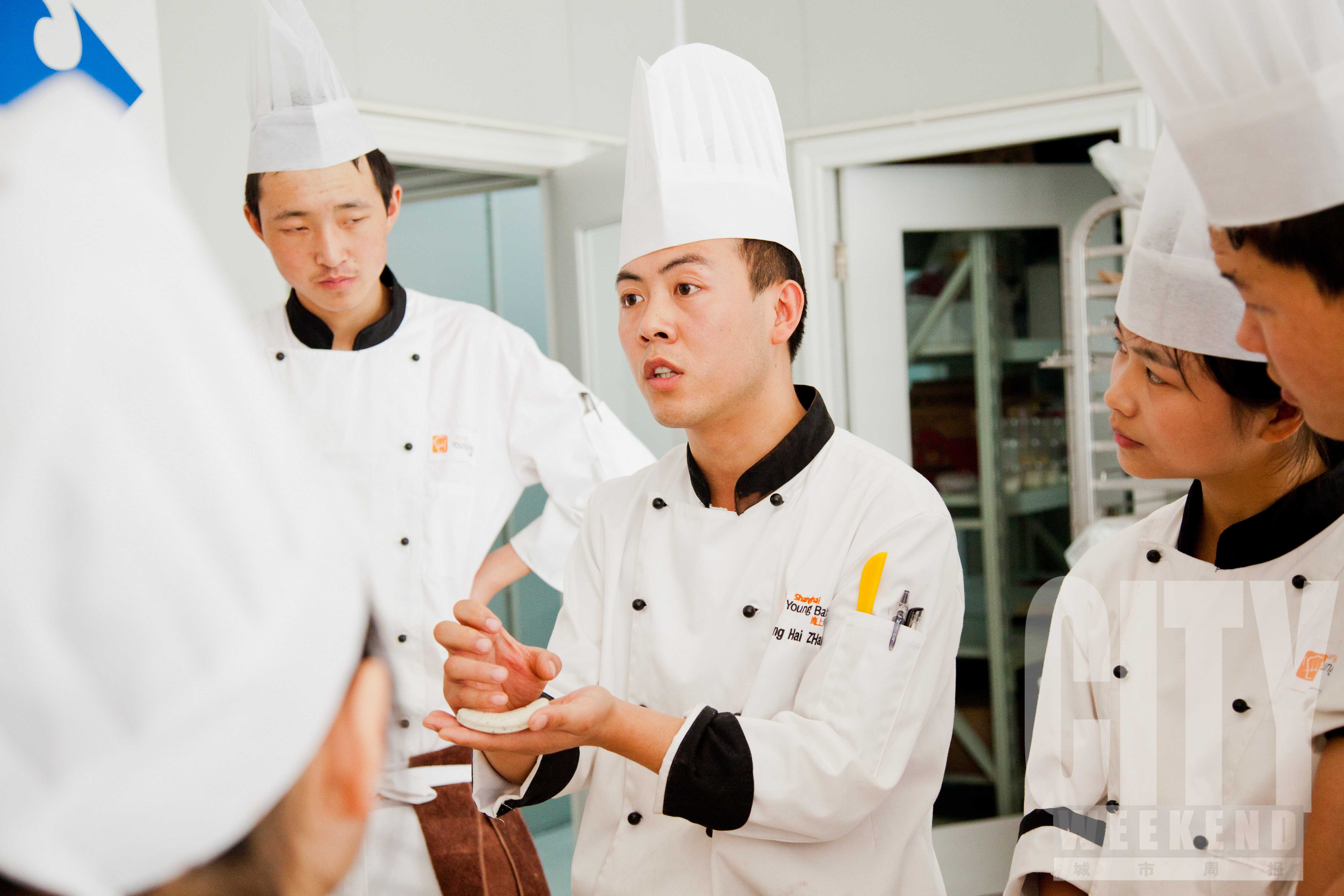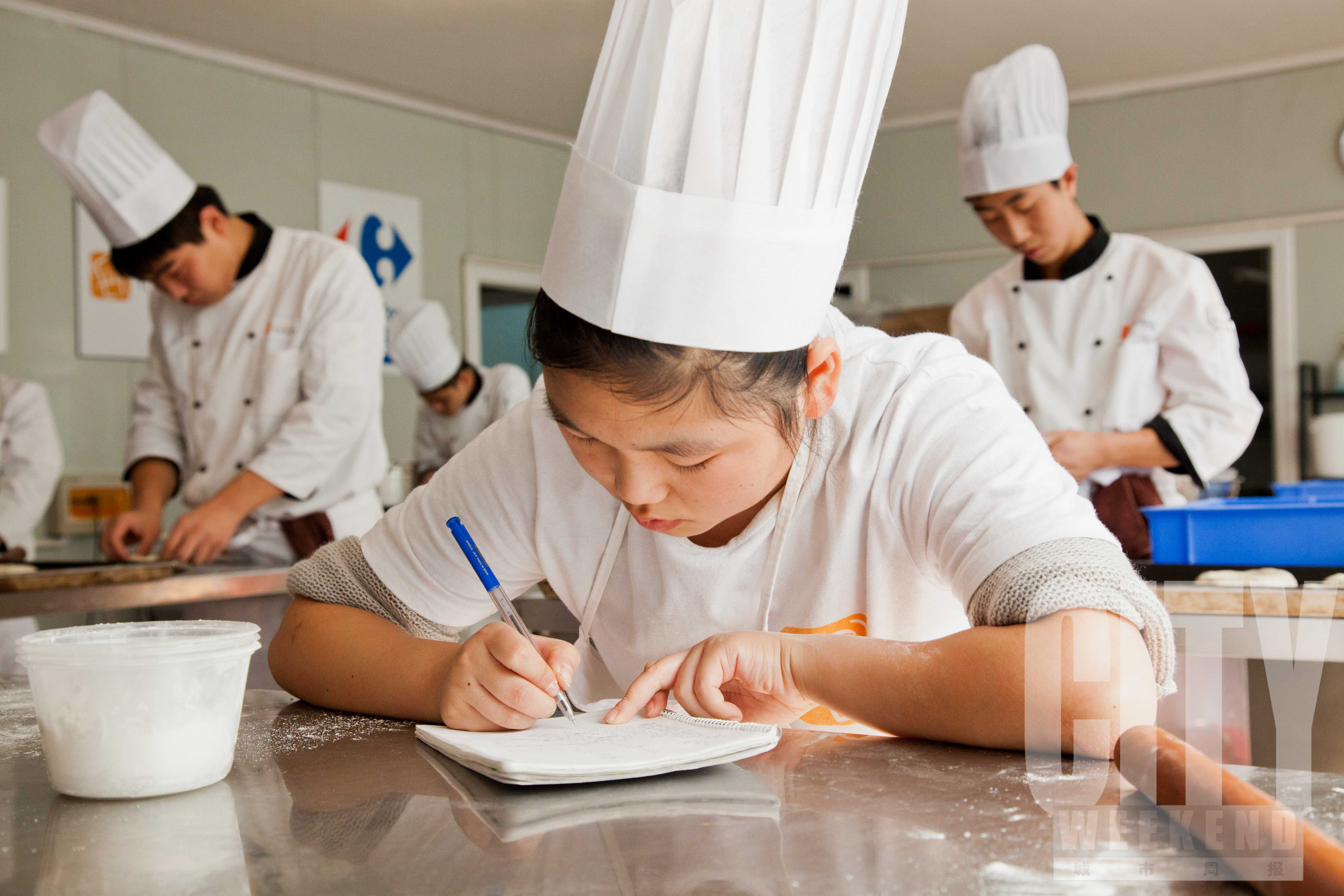< City Weekend> – Shanghai Young Bakers: The Bakery Helping Disadvantaged Youth
Deep into Putuo District the sweet smell of freshly-baked bread wafts from an old factory-like building. In an extremely warm room inside, 11 students neatly dressed in baker uniforms are busy following recipe instructions, oblivious to observers. They gather around their instructor, who shows them how to do recipe math, then scatter to their own tables to make dough.
No ordinary baking school, Shanghai Young Bakers is a non-profit organization sponsored by The Carrefour Foundation and provides French bakery training to disadvantaged Chinese youth 17 to 23 years of age. Inspired by a similar program in Vietnam, 12 French volunteers founded the school in 2008. The students, who come from all over China, undergo a year of intense professional training. They are selected based on their financial background and motivation, with the help of partner NGOs like Chi Heng Foundation, Children of Madaifu and Baoji Xinxing Aid for Street Kids.
“Sometimes we go to the applicants’ homes to check their living conditions and make sure we are selecting students who really need help and are also interested in learning how to bake,” says program manager Floriane Lemoine. She also introduces their all-star staff. “We were lucky enough to find a French bakery chef who speaks good Chinese for our first two classes of 21 students. At the end of the first year, we selected three of the best students to further their training at Ecole Française de Boulangerie d’Aurillac in France. Now they are our trainers; this is what we call our ‘Train-the-trainers’ program.”
Perhaps because the trainers are former students who share similar experience and background to the new students, they conduct their class very strictly. From 8am to 5pm Monday to Wednesday, neither they nor their students take any break except a short lunch. Even during our visit, trainer Zhang Zhenghai, 25, from Shaanxi, spared only two minutes for us. “I’m grateful to have the opportunity to learn baking in Shanghai and even in France,” says Zhang. “I want to make sure I pass all the necessary skills and knowledge to each student. We not only teach the baking process but also teach them to think creatively, just like the way we were trained by our French chef instructors.”
Twenty-four-year-old Wang Li, from Henan, believes her learning experience has totally transformed her. “I thought baking was just as simple as making Chinese dumplings at home. It was exciting to find out that there’s so much to learn about baking,” Wang says. “It’s a science in the way that you need to calculate the recipe for different breads; it’s also an art because we can create new recipes, too.” School has changed her diet as well. “Personally I find myself more health conscious because now I have a much better idea about what each kind of bread is made up of. I tend to eat bread with healthy ingredients instead of the ones made with too much sugar or supplements. ”
The SYB program allows students to gain practical skills by alternating two weeks of class with two weeks of interning at international hotels. It is based on the French professional diploma CAP, as developed by the Ecole Française de Boulangerie et Patisserie d’Aurillac. As such, the curriculum and exams are designed under the supervision of EFBPA. “Besides practice classes focusing on recipes such as French baguettes, country breads and croissants, we also teach theory such as ingredients composition and nutrition; food quality and safety and workplace hygiene,” says trainer Xiao Jinjin, 24, from Anhui.
Given the popularity of Taiwan-inspired bakeries in China, the students also learn how to make Chinese-style breads and pastries, a curriculum that’s developed by Shanghai Caoyang Vocational School. The products include sweet breads with red bean or meat floss, egg tarts, mousse cakes and the like. Within the one-year program, students attain both basic and intermediate levels of the official Western Bakery (西式面点师) diploma, which is awarded by the Shanghai Labor Bureau and recognized throughout China.
Additionally, NGOs Stepping Stones and Included (formerly Compassion for Migrant Children) teach the students English and communication / presentation skills, respectively, Thursdays and Fridays. The lessons are vital for their internships at five-star hotels where most executive chefs are foreigners. “It also helps boost their confidence since most of them didn’t have money to attend high school,” Lemoine adds.
Since the SYB program started in February of 2009, four classes totaling 74 graduates are working at different bakeries and hotels in and around Shanghai. There is currently one each, for example, at Sunflour Bakery and Cafe, glo London and Hyatt on the Bund. They typically earn RMB2,000-2,500 a month. After two years of experience, they usually make up to RMB4,000.
“Finding a job is the easiest part for the students,” says senior program manager Cecile Cavoizy. “They usually have three to four offers already before graduation. We tell them to take their time and decide which is the best for them.”
“Although SYB’s one-year training only teaches them basic skills for a baker, we are still happy to hire them because they are really hard working,” says Sunflour’s chief baker, Guo Leifei. “They learn and grow quickly here.” And the quality of graduates only improves. Xiao is particularly proud of her current students. “I find them braver and more innovative than the earlier classes,” she praises. “At the hotels, they are not intimidated and always interested in trying out new tasks.”
As SYB matures, they are able to contribute to other charity initiatives. In July, trainers and students traveled to Shigatse, Tibet, to assist Braille Without Borders, an international organization for the blind, in developing their bakery school.

Over 10 days, the team helped the school identify needed equipment and rearrange the kitchen space. “We put a table in the middle to divide the kitchen into two parts: one for the oven, the other for operation, so that students with better visual ability can work in the oven space, and others can work in the preparation space, which is better for safety reasons,” Wang Li explains. The SYB team also aided in creating recipes tailored to local tastes by using Tibetan butter and organic vegetables from farms nearby. Cavoizy was very happy with the students’ performance. “One year ago, they still needed others’ help, but now they themselves can help others and give back to society.”
SYB’s slogan is “Give an orphan some bread; you feed him for the day. Teach him to bake; you feed him for a lifetime,” which seems modest to us. The organization looks to have far more baking than that.
The original link: http://www.cityweekend.com.cn/shanghai/articles/blogs-shanghai/cw-radar/shanghai-young-bakers-the-bakery-helping-disadvantaged-youth/





